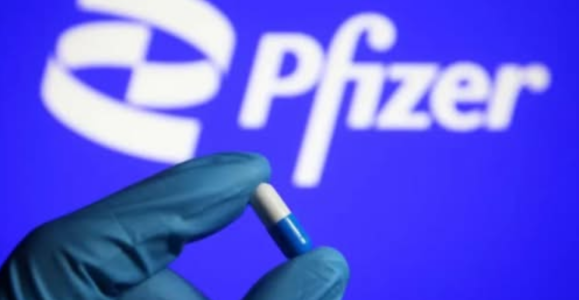Company halts drug development over serious health risk—should you worry?
By
Gian T
- Replies 40
In a move that has raised eyebrows and concerns across the medical community, one of the world's leading pharmaceutical companies has announced the discontinuation of its much-anticipated medication.
This oral drug, which was being developed as a potential game-changer in the treatment of obesity, akin to a pill form of the popular injection Ozempic, has been axed amid fears of health issues.
The decision to halt the production of danuglipron came after a patient in the clinical trial experienced a liver injury that could potentially be attributed to the medication.
Dr Chris Boshoff, Pfizer's Chief Scientific Officer, expressed disappointment in the development's discontinuation but emphasised the company's ongoing commitment to bringing innovative medicines to patients.
While the patient in question did not exhibit liver-related symptoms or side effects, the incident was enough to prompt Pfizer to take a step back and reevaluate.
It's important to note that elevated liver enzymes, which were observed at a rate consistent with other approved GLP-1 drugs for weight loss in over 1,400 participants, can be a precursor to liver cancer if left unchecked.
The once-daily pill was still in the early stages of testing, with researchers determining the optimal dosage for patients.
Pfizer planned to advance danuglipron into late-stage testing, the final phase before seeking government regulatory approval.
However, the discovery of the liver injury led to the company's decision to cancel the drug's development altogether.
Despite this setback, Dr Boshoff assured me that Pfizer would not give up on the quest to develop an effective weight loss pill.
The company plans to address cardiovascular and metabolic diseases, including obesity, by advancing other investigational treatments in its pipeline.
Pfizer has also stated that data from the development program of danuglipron will be shared with the scientific community at a future forum or through publication in a peer-reviewed journal.
The demand for weight loss medication has surged recently, with most options available in injection form.
Ozempic, for instance, has seen staggering sales, reaching approximately $16.7 billion in the US in 2024.
With over 15 million Americans holding a prescription for this blockbuster drug, the market for weight loss treatments is robust.
Mounjaro, a sister drug to Ozempic, also gained fame for its weight loss benefits and generated $3.5 billion in sales in just the last quarter of 2024.
Meanwhile, the only oral GLP-1 drug approved by the Food and Drug Administration is Novo Nordisk’s Rybelsus, which treats Type 2 diabetes and has achieved about $3.38 billion in sales in 2024.
It's worth mentioning that Pfizer had previously abandoned a twice-a-day oral version of danuglipron in 2023 after a significant number of patients in a clinical trial experienced adverse effects such as nausea and vomiting.
This news reminds our readers, particularly those over 60 who may be considering or currently using weight loss medication, of the importance of staying informed about their medicines.
Always discuss the risks and benefits of any treatment with your healthcare provider, and report any unusual symptoms immediately.
The discontinuation of danuglipron is a cautionary tale in pursuing medical innovation.
While the quest for new and effective treatments is essential, patient safety must always be paramount.
As Pfizer redirects its efforts, the medical community and patients will be watching closely to see the next steps in the battle against obesity and related health issues.
Similarly, the Therapeutic Goods Administration (TGA) issued a safety alert about Garcinia gummi-gutta and hydroxycitric acid, ingredients in some weight loss medicines and supplements.
Reports were increasing of liver injuries linked to products containing Garcinia gummi-gutta, with some cases requiring hospitalisation or liver transplants. You can read more about it here.
Credit: YouTube
 Have you or someone you know been affected by the discontinuation of danuglipron, or do you have experiences with other weight loss medications? Share your thoughts and stories with us in the comments below.
Have you or someone you know been affected by the discontinuation of danuglipron, or do you have experiences with other weight loss medications? Share your thoughts and stories with us in the comments below.
This oral drug, which was being developed as a potential game-changer in the treatment of obesity, akin to a pill form of the popular injection Ozempic, has been axed amid fears of health issues.
The decision to halt the production of danuglipron came after a patient in the clinical trial experienced a liver injury that could potentially be attributed to the medication.
Dr Chris Boshoff, Pfizer's Chief Scientific Officer, expressed disappointment in the development's discontinuation but emphasised the company's ongoing commitment to bringing innovative medicines to patients.
While the patient in question did not exhibit liver-related symptoms or side effects, the incident was enough to prompt Pfizer to take a step back and reevaluate.
It's important to note that elevated liver enzymes, which were observed at a rate consistent with other approved GLP-1 drugs for weight loss in over 1,400 participants, can be a precursor to liver cancer if left unchecked.
The once-daily pill was still in the early stages of testing, with researchers determining the optimal dosage for patients.
Pfizer planned to advance danuglipron into late-stage testing, the final phase before seeking government regulatory approval.
However, the discovery of the liver injury led to the company's decision to cancel the drug's development altogether.
Despite this setback, Dr Boshoff assured me that Pfizer would not give up on the quest to develop an effective weight loss pill.
The company plans to address cardiovascular and metabolic diseases, including obesity, by advancing other investigational treatments in its pipeline.
Pfizer has also stated that data from the development program of danuglipron will be shared with the scientific community at a future forum or through publication in a peer-reviewed journal.
Ozempic, for instance, has seen staggering sales, reaching approximately $16.7 billion in the US in 2024.
With over 15 million Americans holding a prescription for this blockbuster drug, the market for weight loss treatments is robust.
Mounjaro, a sister drug to Ozempic, also gained fame for its weight loss benefits and generated $3.5 billion in sales in just the last quarter of 2024.
Meanwhile, the only oral GLP-1 drug approved by the Food and Drug Administration is Novo Nordisk’s Rybelsus, which treats Type 2 diabetes and has achieved about $3.38 billion in sales in 2024.
This news reminds our readers, particularly those over 60 who may be considering or currently using weight loss medication, of the importance of staying informed about their medicines.
Always discuss the risks and benefits of any treatment with your healthcare provider, and report any unusual symptoms immediately.
The discontinuation of danuglipron is a cautionary tale in pursuing medical innovation.
While the quest for new and effective treatments is essential, patient safety must always be paramount.
As Pfizer redirects its efforts, the medical community and patients will be watching closely to see the next steps in the battle against obesity and related health issues.
Similarly, the Therapeutic Goods Administration (TGA) issued a safety alert about Garcinia gummi-gutta and hydroxycitric acid, ingredients in some weight loss medicines and supplements.
Reports were increasing of liver injuries linked to products containing Garcinia gummi-gutta, with some cases requiring hospitalisation or liver transplants. You can read more about it here.
Credit: YouTube
Key Takeaways
- Pfizer has ceased the development of danuglipron, a medication designed to be an oral alternative to the GLP-1 drug Ozempic, due to liver injury concerns.
- A single patient experienced a potential drug-induced liver injury that resolved after discontinuing the medication; however, the specific nature of the injury remains undisclosed.
- Despite the setback, Pfizer remains dedicated to developing medications for weight loss and other metabolic diseases, with future results from the danuglipron development program expected to be shared in scientific forums or peer-reviewed journals.
- Current weight loss medications have seen a significant surge in demand, with most available as injections, such as Ozempic and Mounjaro, boasting multi-billion dollar sales, in contrast to the sole oral GLP-1 approved drug, Rybelsus.








